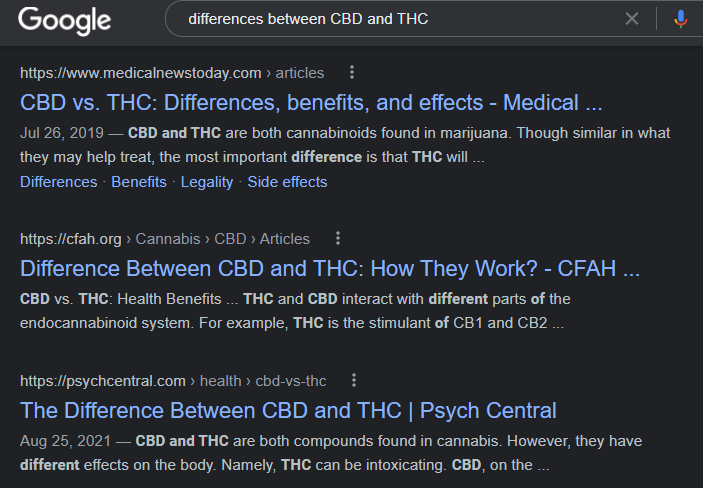If you’ve done any type of digital marketing, then you will have seen and heard the term ‘keywords’ from all corners. Keyword research is one of the cornerstones of online marketing strategies and something you should know how to do and do well. So without further ado, let’s see how to do keyword research for your SEO needs.

What is a Keyword?
When you use Google to look up information about something, the string of words you type in the search engine box is called a query. Within seconds, Google presents you with thousands of links to pages that contain the information you queried for. More often than not, the first few links contain exactly the information you need.
How do search engines manage to get it right almost all the time? The secret is that pages incorporate keywords into their content. As a matter of fact, you might find some of the words you used in your query highlighted in the results presented.
For example, when I type ‘differences between CBD and THC’ into Google, the results present some of the words from my query in bold.

Those are keywords, and knowing how to use them will organically boost the ranking of your content on search engine result pages.
(If you need to do SEO for CBD, we have the perfect guide just for you)
How To Use Keywords
You can and should use keywords in all the content you put online. This means your blogs, videos, pictures, and even social media content needs to have keywords.
Pictures & Videos
It goes without saying that the pictures and videos you post should be relevant to the topic you’re expounding on and should feature the highest quality resolution. But since you can’t write relevant keywords on pictures and videos, how can you incorporate them?
You can do this through the title and metadata. When posting videos to YouTube or other platforms, the meta description can hold all the relevant keywords.
A meta description is an HTML tag that contains a brief explanation of the content on an internet page or video. The title and meta description appear on the search engine results page, making it possible for users to tell at a glance if the content is relevant to their search. A good meta description makes more people click on your content, and this drives the link up the ranks of search engine results because it is deemed useful.
A picture’s metadata refers to the invisible code that holds information about an image. Make relevant keywords part of this information as you post pictures on the internet. You can also include keywords in the file name and alt tag for the image.
Written Content
Adding keywords to your website’s blog or page content is a much easier and more straightforward process. Many keywords contain a string of words that internet users query for, which makes it easy to naturally incorporate them into a sentence.
Make sure you insert a keyword or sentence in the following areas of your content:
- URL
- Title
- Meta description
- 1st paragraph
- Subtitles
- Throughout the article
You should also include keywords throughout the article. However, piling as many keywords as possible within your article will not boost your rankings. Search engines recognize such tactics as spam and might even restrict access to your site. A keyword density of 10 for every 1,000 words makes it possible for you to do it naturally and effectively.
How to Do Keyword Research
Since you now know how to use keywords, let’s see where you can find the right keywords for your content.
Best Keyword Tools
There are numerous keyword research tools available online that will boost your SEO efforts. The best ones are those that provide you with a lot of keyword options so you have a whole range to choose from.
Moz Keyword Explorer is one of the biggest SEO tools used by digital marketers. Once you insert a keyword into the tool’s search bar, you will get a full list of suggestions and an overview of each keyword. You can see which keywords are the most popular, your chances of improving your rankings by each keyword, and save the keyword lists offline for future use.
GetKeywords is another research tool that provides keywords specific to the area your business is located in. If you own a medical marijuana dispensary or any other legal outlet, this search tool will let you know what locals are looking for so you can provide it.
How to Choose the Best Keywords
You should not use all the keyword suggestions the tool generates in your content. Neither should you restrict yourself to the top keywords in hopes of attracting more traffic to your website.
You will get the best SEO results if you:
- Use words specific to your target audience: you might be running a legal cannabis business, but the product still elicits a lot of stigmas. Unfortunately, search engines and other internet sites hide content that contains words like ‘marijuana’, promoting those with the scientific term ‘cannabis’. So while you should use ‘cannabis’ as much as possible, do not shy away from the more euphemized terms like ‘pot’ and ‘herb’. If you want to improve local rankings for your business, look for keyword suggestions that have the local slang for cannabis and use them judiciously in your content.
- Combine both short-tail and long-tail keywords: short keywords with one or two words have long been the staple of SEO, but longer keywords with more than 5 words are becoming more popular. The use of the latter is driven by the fact that more people speak rather than type their queries into search engines. So while it might be harder to incorporate statements like, “I want good pot for chilling,” into a meta description, successfully using them in headings and paragraphs will see your rankings improve.
- Choose mid-to-high difficulty keywords: the higher the search volume for a keyword, the more the content containing the keywords. If you use popular keywords in your content, then your site will have to battle with tons of established sites for the front pages of search engine results. Keywords with middle or high difficult scores may have less volume, but by using them, you can tap into a niche of users who want specific information or products.
Parting Shot
Keyword research is one of the most important components of SEO. Knowing how to do keyword research is one of the first things you need to do if you are to successfully put your business on the map. Once you hone your keyword research abilities and couple them with other SEO and marketing strategies, you will see results that you can be proud of.

